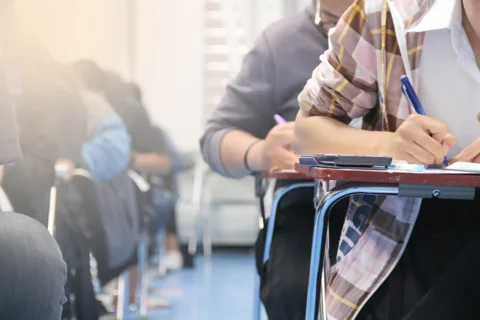
Dan Rosenberg
Partner, Education & Public Law Solicitor

If your family need help with an education or Special Educational Needs and Disabilities (SEND) dispute, Simpson Millar is here for you.
We have the largest team of top ranked Education Law specialists in the England & Wales. Our experienced Education Solicitors and SEND Lawyers can help you find the right solutions for your child, so they get the education they deserve.
Tackling Education and SEND disputes without support can be overwhelming. You want what’s best for your child, but it can feel as though there are barriers in place. At Simpson Millar, we understand. Our specialist team can guide you through each process with expert advice, voicing your concerns and leading negotiations so you can put your family first.
We represent parents and children, not Local Authorities, so you and your child will always be our priority. No matter how complex your educational or SEND issue is, we'll be with you every step of the way.
Our Education Solicitors are legal professionals who specialise in England & Wales education law. We offer expert advice and legal representation to parents, guardians, and students facing issues within the educational system. Simpson Millar’s Education Solicitors can help parents ensure that educational institutions and authorities meet their legal obligations and uphold their child’s educational rights.

Education Solicitors handle a broad range of legal issues related to schools and educational settings, including pre-school, primary, secondary and tertiary education institutions.
Working on behalf of parents and guardians, our Education Solicitors provide specialist advocacy for children to help secure their rightful access to education and support.
We know that fighting to get your child’s educational needs met can be complex. So, having an our education law experts by your side means greater clarity and a focused approach.
At Simpson Millar, we have the largest national team of top-ranked education lawyers in the England & Wales.
Our expert Education Solicitors and Special Educational Needs and Disabilities (SEND) Lawyers can help you find the right solutions for your child to ensure they receive the education and support they are entitled to.
Our education law services include:
If you have a child with special educational needs, we know it can be challenging to get their needs met in school.
Local Authorities’ education budgets are squeezed, and school resources are stretched, meaning they sometimes have other priorities. But every child has the right to an education and getting the right provision now will help get your child’s education on the right path.
At Simpson Millar, we will review your situation and give you the Special Educational Needs (SEN) advice your family needs.
And if you need to go further and appeal to the SEND Tribunal or take action with a Judicial Review to enforce provision, we will be there for you.
Our highly experiences Education and SEND solicitors help families challenge issues relating to Education, Health and Care Plans (EHCPs) including:
Our EHCP Appeal specialists have years of experience in helping children get detailed, up to date Education Health and Care Plans (EHCPs) that fully meet their needs.
Whether you want help you from the day you receive your decision letter, just want tactical or strategic advice at specific stages, or would like us to represent you at a hearing, our aim is always to do everything possible to get your child the assistance they require.
If your Local Authority hasn’t issued the final EHCP in time we can help you take the necessary legal action to protect your child's educational rights.
The first step to dealing with a missed EHCP deadline, is to register a formal complaint with your Local Authority. If you're not satisfied with the response, we can escalate the matter to the Local Government and Social Care Ombudsman (LGSCO).
Alternatively, we can initiate a Judicial Review against the Local Authority, a claim to the High Court seeking an Order for your Local Authority to issue the final EHCP.
The appeals process will look different depending on your child and their needs, but no matter which stage you are up to, our Education Lawyers can help you.
The SEND Tribunal is a national, independent process for appealing decisions related to special educational needs and disabilities of children and young people. Its full name is the First-tier Tribunal (Special Educational Needs and Disability).
The Special Educational Needs and Disabilities (SEND) Tribunal reviews evidence to determine if your Local Authority (LA) followed the law and Code, before making a decision based on your child's needs.
The process that the hearings will take depends on factors such as which section of your child’s EHCP you’re appealing, whether you’re attending the hearing with legal representation or witnesses, and whether your hearing is in person or virtual.
Our SEND lawyers will prepare you for what’s ahead and guide you through the process.
Choosing the right school for your child is important. So, when you’ve considered all options and made an informed decision about what’s best for your child, it can be difficult to discover the school they’ve been offered isn’t what you hoped for.
If your child has not been offered a place at your preferred school, you have the right to appeal. Our School Admission Appeal Solicitors will provide realistic advice on the merits of an appeal and support you throughout the appeal process.
We also specialise in helping parents with in-year admissions and strategic advice around challenging school admissions criteria before applications.
If your child has been excluded from school, or is at risk of exclusion, we can help you. Our school exclusion lawyers Solicitors have experience challenging both permanent and fixed-term exclusions and if needed can attend appeals and hearings before the governing body and Independent Review Panel.
At Simpson Millar, we have a legal aid contract and can bring Judicial Review proceedings where exclusions or other actions forcing a child out of school are potentially unlawful.
Our Education Law team can also help with the next steps whether you’re looking for advice if your teenager has been excluded from school, or because your child has been excluded from primary education.
If your child is currently out of school, we know how worrying and draining it can be.
Perhaps, they’ve been excluded, are new to the area, or have been “off-rolled”. Other reasons include experiencing bullying in school or suffering from mental health issues. Alternatively, you may have difficulty finding a school placement that fits your child’s Special Educational Needs, or you might have a place in school, but your challenge is getting them to it.
Whatever the reason, working out the right course of action isn’t always straightforward. With our Education Solicitors by your side, we can identify your options, offer legal strategies, and if needed we can take appropriate legal action to enforce your child’s right to education.
Bullying in school is an unfortunate fact of school life for many children and can be a highly emotional experience for the whole family.
Although every school is required to have a behavioural policy, the way in which bullying is dealt with varies from school to school.
Bringing perspective and experience, we can review the matter dispassionately and offer expert advice to encourage school to take appropriate action. If there is no effective anti-bullying policy in place, our Education Law team can escalate matters and bring your situation to a Judicial review.
If your child is the target of bullies, and conversations with school have not led to a resolution, our Education Lawyers are here to help you.
We understand how difficult school disputes can be, after all, your child’s education is so important. If you are in dispute with an independent or private school, our education law specialists can help.
We have significant experience in representing families with issues like:
Our Education Lawyers are adept at navigating disputes within independent and private schools. We can take on the hard work for you and use our legal expertise to reach your desired outcome.
The judicial review process allows parents to challenge decisions made by schools, Local Authorities, and other public bodies.
In Judicial Review proceedings, our Education Solicitors enforce legal obligations in education law. It is an effective tool for resolving urgent issues and removing obstacles. When a public body is acting unlawfully, often just the threat of legal action can resolve matters.
Unlike some firms, Simpson Millar has a legal aid contract meaning we can take matters to court if needed. Because of this, our education law team have years of experience with conducting Educational Judicial Reviews and supporting families throughout the process to achieve the best result.
If a school, or any education provider, treats you or your child unfairly because of who you are, it may be discrimination. It is extremely upsetting, and you have the right to take action.
If you believe that your child has been discriminated against at school, our experienced Solicitors can provide you with pragmatic advice and robust support, so you can make a challenge and achieve the right result for your child.
As well as discrimination claims, there may be alternative options available. Whatever action is necessary, our Education Solicitors will help you find the right route to achieve a just outcome.
Our education law specialists represent parents, guardians and children, across England and Wales. Our focus is supporting you and your family as you hold educational institutions to account and secure the right solutions for your child.
With the largest team of top ranked Education Law specialists in the England & Wales, our expert Education Solicitors and SEND Lawyers will provide comprehensive and impartial advice, as well as up-to-date specialist knowledge to help you achieve the best possible outcome for your child.
Our goal is to provide accessible legal support so that every child has access to the education they deserve. That’s why we offer various fixed fee and reduced fee schemes to help clients manage finances, including legal aid for eligible cases.
Yes, we will confirm who your primary lawyer is and who will oversee your case. Sometimes, it’s beneficial for more than one dedicated lawyer to be involved. When this applies to your case, we will let you know.
Not unless you wish to. We understand that some people prefer in-person meetings and clients are welcome to visit one of our fully accessible offices.
However, for many education law cases, meeting in-person isn’t necessary. Instead, we offer remote consultations via phone or video calls for maximum convenience.
While we can’t guarantee the outcome of a case, our vast experience and expertise can help to improve the chances of a favourable outcome.
Integrity is crucial, that’s why we will only pursue a case using public funds (Legal Aid) if we believe success is likely.
If your case is privately funded, we will advise you on the realistic prospects of a successful outcome so you can make an informed choice to pursue the case, or not.
The duration of each legal process varies depending on the complexity and specific circumstances.
School exclusions and admissions appeals are generally dealt with in a matter of weeks, though challenges to those appeals can take a number of months or more.
Special Educational Needs appeals can last approximately five months from start to finish.
Our initial legal advice will usually include an estimate of how long we expect your case to take but if you want to clarify, please just ask.
We understand how important timescales can be when your child’s education is at stake. That’s why our specialist education law team are realistic when estimating timelines and strive to resolve issues as efficiently as possible.
Costs depend on the nature of the legal services required. However, we will always be transparent about anticipated costs and seek your agreement before we begin work.
We will advise immediately whether you’re eligible for Legal Aid or liable to privately fund your case.

In this Judicial Review case, we acted on a complex transport policy issue for A, a 13-year-old boy in Year 8 with an Education Health and Care Plan (EHCP).

We helped a child’s parents bring a judicial review and a positive ending in a case where the Local Authority were failing to provide suitable education.

Our Education Law Solicitors recently helped a family secure a residential place in an independent school for their year 7 child with severe developmental verbal dyspraxia.
If your child has Special Educational Needs and Disabilities (SEND), there are specific legal obligations in place to support their education that must be met by schools.
Parents can ask their Local Authority for an Education, Health and Care Needs Assessment (EHCNA) if they think their child has SEND.
An EHCNA could lead to an Education Health and Care Plan (EHCP), a legally enforceable plan outlining your child's needs and required educational support.
If your child has SEND, or you suspect they do and aren't getting the right support, you can seek legal advice from our Education Solicitors and SEND Lawyers.
Early intervention can help minimise future problems, and avoid unnecessary delays, so you can secure the right support for your child’s education.
A child or young person has Special Educational Needs (SEN) if they have greater difficulty in learning than the majority of others the same age, or if they have a disability which prevents or hinders them from making use of normal educational facilities.
SEN is generally split into four key areas:
This can include finding it hard to talk with others or understand what people are saying. It might also include struggling to express themselves or follow conversations, making social interactions tough.
Children with diagnoses of Autistic Spectrum Disorder (ASD) often have needs in this area, particularly if they find it difficult to engage in shared conversation or read social cues.
If a child or young person needs relate solely to speaking English as an additional language (EAL), it can be more difficult to establish whether they have special educational needs. This should be looked at closely if there are any concerns.
This area of SEN ranges from children who learn slower than their peers to those who have severe learning difficulties. Children with cognitive and interaction needs might find reading, writing, or maths particularly challenging and need lessons tailored to their pace and style.
Children with cognition and learning challenges often have difficulties processing information. This can sometimes be related to Attention Deficit Disorder (ADD), Attention Deficit and Hyperactivity Disorder (ADHD), or specific learning difficulties such as dyslexia or dyscalculia.
Children with SEMH needs struggle with regulating their emotions or behaviour, affecting their ability to learn and make friends. They might feel anxious, act out, or seem withdrawn, which can make educational settings challenging.
Emotional vulnerabilities, such as attachment disorders will also be considered a SEN if it affects the way a child learns.
This includes difficulties with mobility, coordination and balance, or fine motor skills. Health conditions, if they affect learning or access to school facilities are also likely to be considered SEN. This area of need also includes children and young people whose learning is affected by particular sensitivities around sight, smell, sounds, or touch.
Children with special educational needs may have difficulties that fit clearly into one area, have needs that span two or more areas, or the precise nature of their need may not be clear.
Our team of lawyers can help you establish your child’s SEN legal rights and work to ensure education obligations are met.
All children with special educational needs have a right to receive support in education. But if you believe your child’s needs are not being met, we can support you in raising concerns, challenging decisions and negotiating outcomes. If necessary, we will bring your case to a Special Educational Needs and Disability Tribunal or appeal to judicial review.
Our SEND lawyers can help families secure:
Our dedicated team of specialist education law solicitors will help you voice concerns you may have about your child's education and negotiate solutions with schools, colleges and local authorities. If necessary, we can raise your dispute at a Special Educational Needs and Disability Tribunal or appeal to Judicial Review to secure the educational provisions your child deserves.
No. You can experience Special Educational Needs without a diagnosis.
The focus of the SEN Code of Conduct is a child’s educational needs, rather than their medical diagnosis and the Upper Tribunal has made it clear that needs can be assessed without knowing their precise cause.
An Education, Health and Care Plan (EHCP) is a comprehensive legal document created on behalf of children and young people with special educational needs and disabilities. It sets out their educational, health, and social care needs, to help secure the right additional educational support.
If you disagree with the EHCP that has been put in place for your child, you can bring an appeal to the SEND Tribunal. However, in most cases you must first talk to a mediation adviser before you appeal. Our solicitors can guide you through the EHCP appeal process.
If your child wasn’t offered a place at your chosen school, our school admission appeal lawyers can help you.
The process typically involves submitting a written appeal and attending an independent hearing. The hearing is an opportunity to set out your reasons for appealing before the panel will decide whether to overturn the Local Authority's decision.
Although the school admissions appeal process is designed to be parent-friendly, our Education Lawyers have years of experience in advising and representing parents.
We’ll review your situation to establish the right approach and tactics, so your appeal is successful and secures the school placement that best suits your child.
If your child is excluded from school, we recommend you contact our Education Solicitors immediately for advice on appealing the decision and ensuring your child's ongoing educational rights are protected.
Seeing the impact bullying is having on your child and their education is extremely difficult for parents.
Through a combination of open conversations between parents and teachers, and constructive action from school, issues can often be resolved. But when efforts to manage bullying in schools are unsuccessful, our Education Lawyers can help you move forward.
Simpson Millar has years of experience supporting families with bullying and cyber-bullying in both state and independent schools. Where necessary, we can raise your concerns with school to identify previously unexplored options and invoke decisive action.
Our solicitors can offer impartial advice on the steps to take if your child is being bullied, including how best to work with the school and when to involve legal action.
Independent and private school are subject to the same legal obligations as state schools. If you have a dispute with your child’s school, we can help you understand your rights and the legal options available to ensure your child’s needs are met.
If your child isn’t receiving the educational support they’re entitled to, or their right to education has been affected by a dispute with a school or Local Authority, we’re here to help you.
Contact our team to talk with an Education Solicitor today.

An EHCP (Education, Health and Care Plan) identifies your child’s Special Educational Needs (SEN) and should entitle them to the right provision they need to support them.

The reality of the end of Year 12 for all students normally includes a set of internal exams. This helps the school or college to have a better understand of how well pupils have coped with the transition from GCSE to A Level work, and helps inform the process of providing predicted grades to universities.

If your child has Special Educational Needs and Disabilities (SEND), they may need an Education, Health and Care Plan (EHCP). But we understand that EHCPs can be confusing.